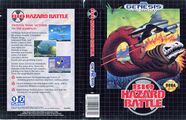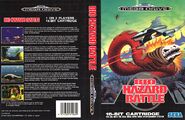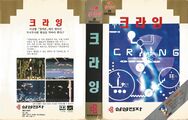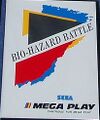Difference between revisions of "Bio-Hazard Battle"
From Sega Retro
| Line 39: | Line 39: | ||
| oflc=g | | oflc=g | ||
}} | }} | ||
| − | '''''Bio-Hazard Battle''''', known as '''''Crying: Aseimei Sensou''''' (クライング 亜生命戦争 | + | '''''Bio-Hazard Battle''''', known as '''''Crying: Aseimei Sensou''''' (クライング 亜生命戦争) in Japan, is a 1992 shoot-'em-up game by [[Sega]] for the [[Sega Mega Drive]]. |
==Story== | ==Story== | ||
| Line 47: | Line 47: | ||
==Gameplay== | ==Gameplay== | ||
| − | There are four bio-ships available to pilot. | + | There are four bio-ships available to pilot. Tap any button to fire normal shots, and hold/release a button to fire a charge shot. There are a number of different normal shots, represented by powerup colors; strangely, normal shot types are partially shared between certain ships. Each ship has its own unique charge shot. A miniature ship circles around the bio-ship that not only fires its own shots in time with the bio-ship, but also can collect upgrades to its current weapon and can be used as a shield, absorbing enemy bullets before they can hit the bio-ship. |
| − | Extra lives are given out based on score. Most | + | This happens to be one of those games where touching walls does not harm you. |
| + | |||
| + | Extra lives are given out based on score. Most stages also have extra lives in hidden spots; reveal by shooting. | ||
===Powerups=== | ===Powerups=== | ||
*Green: The only weapon shared by every ship. A general purpose spreadshot and the default weapon of each ship. | *Green: The only weapon shared by every ship. A general purpose spreadshot and the default weapon of each ship. | ||
| − | *Red: | + | *Red: Either a red homing laser, or red rings that are reflected on contact. |
| − | *Blue: | + | *Blue: Either a cross shaped laser, or slow homing orbs that can destroy enemy bullets. |
| − | *Yellow: | + | *Yellow: Either a rapid fire cannon, or a straight laser that can also destroy enemy bullets. |
| + | |||
| + | ===Version differences=== | ||
| + | Aside from the fairly lame western logo and title screen (compared to the very cool Japanese ones), the western release has autofire where the Japanese one does not. Further differences unknown. | ||
| − | ==Secret | + | ===Secret stage rumor=== |
Various cheat sites claim there is a secret stage resembling an asteroid field. However, such an stage never existed. | Various cheat sites claim there is a secret stage resembling an asteroid field. However, such an stage never existed. | ||
Revision as of 02:15, 2 July 2016
This short article is in need of work. You can help Sega Retro by adding to it.
| Bio-Hazard Battle | ||||||||||||||||||||
|---|---|---|---|---|---|---|---|---|---|---|---|---|---|---|---|---|---|---|---|---|
| System(s): Sega Mega Drive, Virtual Console, Steam | ||||||||||||||||||||
| Publisher: Sega | ||||||||||||||||||||
| Developer: Sega | ||||||||||||||||||||
| Genre: Shoot-'em-Up | ||||||||||||||||||||
| ||||||||||||||||||||
|
CERO
Missing Parameter! |
Bio-Hazard Battle, known as Crying: Aseimei Sensou (クライング 亜生命戦争) in Japan, is a 1992 shoot-'em-up game by Sega for the Sega Mega Drive.
Contents
Story
The planet Avaron (Avalon on the Japanese box) was plunged into deep biological war, and a retrovirus was synthesized to try to defeat the enemy. Unfortunately, the plan backfires: the planet is rendered nearly inhospitable, and the only survivors of the virus are sent to space to await a time when the new species of creatures that survive or thrive on the virus pose little enough a threat to set up a new colony.
The game's stages display the virus outbreak, e.g. stage 2 is a ravaged city, stage 7 appears to be the facility where the virus was produced. According to the game's credits, ray tracing was used to create some graphics.
Gameplay
There are four bio-ships available to pilot. Tap any button to fire normal shots, and hold/release a button to fire a charge shot. There are a number of different normal shots, represented by powerup colors; strangely, normal shot types are partially shared between certain ships. Each ship has its own unique charge shot. A miniature ship circles around the bio-ship that not only fires its own shots in time with the bio-ship, but also can collect upgrades to its current weapon and can be used as a shield, absorbing enemy bullets before they can hit the bio-ship.
This happens to be one of those games where touching walls does not harm you.
Extra lives are given out based on score. Most stages also have extra lives in hidden spots; reveal by shooting.
Powerups
- Green: The only weapon shared by every ship. A general purpose spreadshot and the default weapon of each ship.
- Red: Either a red homing laser, or red rings that are reflected on contact.
- Blue: Either a cross shaped laser, or slow homing orbs that can destroy enemy bullets.
- Yellow: Either a rapid fire cannon, or a straight laser that can also destroy enemy bullets.
Version differences
Aside from the fairly lame western logo and title screen (compared to the very cool Japanese ones), the western release has autofire where the Japanese one does not. Further differences unknown.
Secret stage rumor
Various cheat sites claim there is a secret stage resembling an asteroid field. However, such an stage never existed.
Production credits
Scenario by: Hiroshi Mikatabara
Programmed by: Tonbe, Kazumi Nasu
Sprite Designed by: Matsu G, Co Tani, Rauly.S.Kine, Senoko
Scroll Designed by: Matsu G, Co Tani, Rauly.S.Kine
Ray Tracing by: Matsu G
Meta Ball Designed by: Senoko
Sound Directed by: K.N.U.
Schedule Management: marsh
Package Designed by: Jordan, Naisho
Package CG Designed by: Matsu G, Rauly.S.Kine
Manual Edited by: Mongoose
Package and Manual Directed by: LibidoCHAN, Janjakajan
Special Thanks to: Lee, J.Yatsuchi, Wiwi Jumbo, Bo
Also Thanks to: Shige D.O.R., Usagi, CegawaHD, Kamikawa, Eriko, Sunset, Kyamura, monkey, Fuzzy, SiFi TZK, Ikepon, Shinyuu, Sim Bancho, Devi and Pea, Atsu, Daichan, Menme
Directed by: Kazumi Nasu
Presented by: Sega Enterprises
Digital manuals
Physical scans
Mega Drive version
| Sega Retro Average | |||||||||||||||||||||||||||||||||||||||||||||||||||||||||||||||||||||||||||||||||||||||||||||||||||||||||||||||||||||||||||||||||||||||||||||||||||||
|---|---|---|---|---|---|---|---|---|---|---|---|---|---|---|---|---|---|---|---|---|---|---|---|---|---|---|---|---|---|---|---|---|---|---|---|---|---|---|---|---|---|---|---|---|---|---|---|---|---|---|---|---|---|---|---|---|---|---|---|---|---|---|---|---|---|---|---|---|---|---|---|---|---|---|---|---|---|---|---|---|---|---|---|---|---|---|---|---|---|---|---|---|---|---|---|---|---|---|---|---|---|---|---|---|---|---|---|---|---|---|---|---|---|---|---|---|---|---|---|---|---|---|---|---|---|---|---|---|---|---|---|---|---|---|---|---|---|---|---|---|---|---|---|---|---|---|---|---|---|
|
| 75 | |
|---|---|
| Based on 29 reviews | |
| Mega Drive, US |
|---|
| Mega Drive, AU |
|---|
|
Mega Play version
External links
References
- ↑ 1.0 1.1 File:GamePro US 041.pdf, page 52 Cite error: Invalid
<ref>tag; name ":File:GamePro US 041.pdf_p52" defined multiple times with different content - ↑ 2.0 2.1 File:Mega UK 03.pdf, page 40 Cite error: Invalid
<ref>tag; name ":File:Mega UK 03.pdf_p40" defined multiple times with different content - ↑ 3.0 3.1 File:MeanMachinesSega02UK.pdf, page 78 Cite error: Invalid
<ref>tag; name ":File:MeanMachinesSega02UK.pdf_p78" defined multiple times with different content - ↑ 4.0 4.1 File:SegaForce UK 12.pdf, page 80 Cite error: Invalid
<ref>tag; name ":File:SegaForce UK 12.pdf_p80" defined multiple times with different content - ↑ 1700 igr dlya Sega, "" (RU; 2001-xx-xx), page 32
- ↑ Aktueller Software Markt, "Februar 1993" (DE; 1993-01-11), page 136
- ↑ Beep! MegaDrive, "November 1992" (JP; 1992-10-08), page 28
- ↑ Consoles +, "Janvier 1993" (FR; 199x-xx-xx), page 84
- ↑ Cool Gamer, "9" (RU; 2002-10-13), page 35
- ↑ Electronic Gaming Monthly, "December 1992" (US; 1992-xx-xx), page 34
- ↑ Entsiklopediya luchshikh igr Sega. Vypusk 1, "" (RU; 1999-xx-xx), page 295
- ↑ Mean Machines: The Essential Sega Guide, "" (UK; 1993-11-18), page 26
- ↑ GameFan, "Volume 1, Issue 1: October 1992" (US; 1992-xx-xx), page 6
- ↑ Gamers, "Dezember/Januar 1993" (DE; 1992-11-19), page 80
- ↑ Hippon Super, "December 1992" (JP; 1992-11-04), page 82
- ↑ Joypad, "Décembre 1992" (FR; 1992-1x-xx), page 104
- ↑ Joystick, "Décembre 1992" (FR; 1992-1x-xx), page 193
- ↑ Sega Mega Drive Advanced Gaming, "February 1993" (UK; 199x-xx-xx), page 40
- ↑ Mega Fun, "11/92" (DE; 1992-10-xx), page 36
- ↑ MegaTech, "November 1992" (UK; 1992-10-20), page 26
- ↑ Marukatsu Mega Drive, "November 1992" (JP; 1992-10-xx), page 108
- ↑ Player One, "Décembre 1992" (FR; 1992-12-10), page 60
- ↑ Play Time, "3/93" (DE; 1993-02-10), page 111
- ↑ Power Play, "2/93" (DE; 1993-01-xx), page 140
- ↑ Sega Power, "January 1993" (UK; 1992-12-03), page 35
- ↑ Sega Mega Drive Review, "1" (RU; 1995-04-03), page 37
- ↑ Sega Saturn Magazine, "September 1995" (JP; 1995-08-08), page 85
- ↑ Tricks 16 bit, "Tricks Sega Gold 800 igr" (RU; 1998-03-20), page 8
- ↑ Video Games, "2/93" (DE; 1993-01-27), page 93
- Pages with reference errors
- Stubs
- No players field
- JP Wii Virtual Console games
- All JP games
- US Wii Virtual Console games
- All US games
- EU Wii Virtual Console games
- All EU games
- Wii games
- All shoot-'em-up games
- 2007 Wii games
- All 2007 games
- Wii Virtual Console games
- Old content rating field
- Use romtable template
- All games
- Use Creditstable template
- Old-style rating (gamefan)
- Rating without source
- Old-style rating (gamepro)
- Use magref
- Old-style rating (joystick)
- Rating without PDF source
- Old-style rating (mdag)
- Old-style rating (mega)
- Old-style rating (megatech)
- Old-style rating (mms)
- Old-style rating (playerone)
- Old-style rating (segapower)
- Old-style rating (sfuk)
- Update ratings template
- 10 old ratings
- Mega Play games






